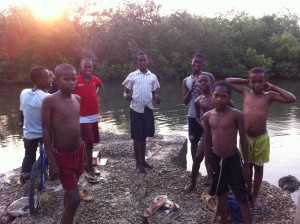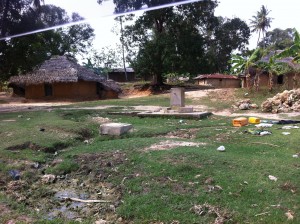On Thursday and Friday of my first week at work I had the opportunity to travel to the northern island of Pemba to participate in a midterm review meeting with our two radio station partners on the island. Kheirat, the program assistant and the person with whom I work most closely, and I boarded a 12-seater plane on Thursday afternoon and took off for the 30 minute flight to Chake Chake, the main town on Pemba.
Pemba is the ignored younger brother of Zanzibar. It has just a fraction of the population, is very quiet and rural and has very little tourism (quite shocking, actually, compared to the hordes of tourists that are everywhere on Unguja). Unfortunately, it is also very neglected and extremely poor, again, because it doesn’t experience the influx of tourism dollars that Unguja does.
We landed at the tiny airport and took a taxi in to the Hafidhi Hotel and Conference Center, one of the nicest hotels on the island and the site of our radio meeting the following day. After settling in to the room, I went for a walk around the town.
Chake Chake was quite run down and, at only 5:30 in the afternoon, had already almost completely shut down for the day (people on Zanzibar joke that after 5 the only thing you can do on Pemba is sleep). People were extremely friendly, though, and most everyone seemed to want to say “jambo” to me without trying to sell me something or offer me their services. I made my way down to the jetty on the waterfront where I met a group of kids that were splashing in the filthy water. The called out to me “muzungu” (white man) and urged me to come down and join them. We managed a few words of a conversation in Swahili but my “unasema Kiingereza?” (do you speak English?) was met with many shaking heads. I turned around and headed back to the hotel.
The following day the meeting began in the hotel conference room and was conducted entirely in Swahili. I tried to pick up as much as I could and some of it was translated to me in English. Only my counterpart, Kheirat, and one of the radio producers could speak any English, though. Even though I didn’t understand much of what was being said, I could tell that the meeting was a success. After the meeting we visited the office of one of the radio stations and then returned to the hotel with a few hours to kill.
We had a little money left over in our budget for the day, so we hired a taxi to take us out to the ruins of Pujini before dropping us off at the airport. This was what was left of a mosque and a small city built by a 16th century tyrant named Mkama Ndume, or “grasper of men”. This small rural village was once a center of commerce and there was an ancient channel into the city where dhows could come in and unload their goods. The steps up the rampart to this port were one of the best-preserved parts of the ruins. There was also the “jealous well” which was allegedly constructed so Mkama Ndume’s two wives could both collect water without having to see each other. It was an interesting excursion for the afternoon and amazing to see how much more urban and cosmopolitan Pemba was 500 years ago.
We finally headed back to the airport and had a nerve-wracking flight into a big storm that was soaking Zanzibar at the time. We landed safely, though, and got some incredible views from the airplane on our way in. Travel even between the islands is prohibitively expensive, so I don’t know how many more opportunities I will have to do this, but it definitely made for an interesting experience during my first week.





